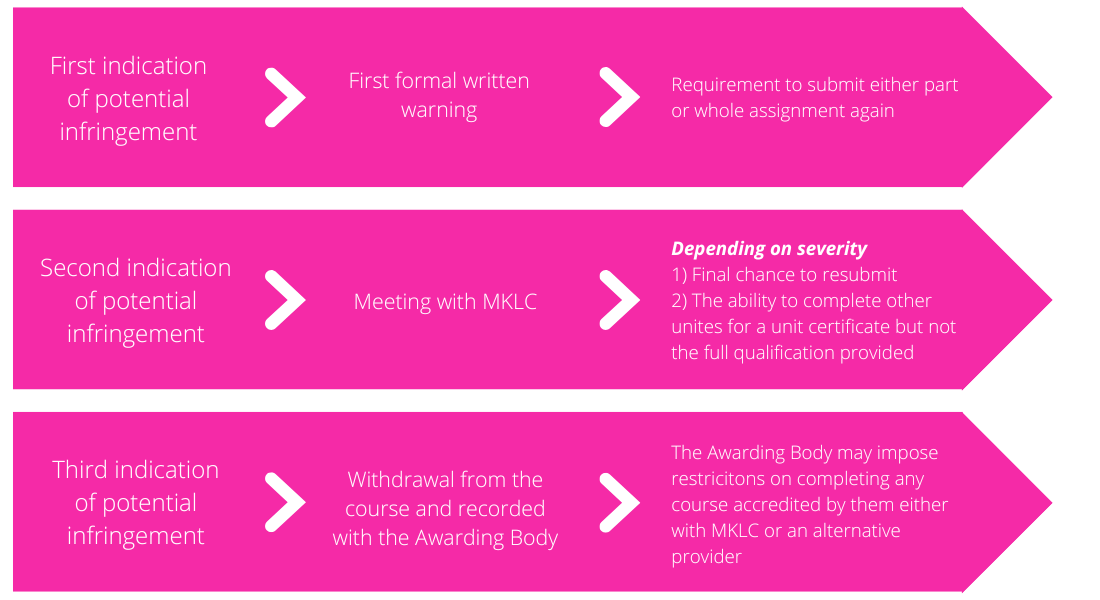
Malpractice and Maladministration Policy
Scope of the policy
This policy is aimed at MKLC customers, including learners and staff members who are using or delivering the qualifications and courses MKLC offer and who are involved in suspected or actual malpractice and/or maladministration.
Purpose of the policy
The purpose of this policy is to set out the steps to follow when reporting suspected or actual cases of malpractice and maladministration. It is also in place to review those processes which led to the suspected or actual case of malpractice and/or maladministration and to support any investigations.
As an approved centre of TQUK, we will act upon any reports of suspected or actual cases of malpractice and/or maladministration that we receive regarding our staff or learners, which may affect the integrity of MKLC training courses, qualifications and quality assurance systems. We also have a professional responsibility to report non adherence to this policy to our awarding organisation, TQUK.
Location of the policy
This policy is available for all staff members, third parties and learners to access.
Communication of the policy
It is important that staff involved in the management, assessment and quality assurance of our qualifications and learners undertaking qualification with us are fully aware of the contents of the policy.
Statement of Principles
Definitions of Malpractice:
Malpractice is any activity or practice which deliberately contravenes regulations and compromises the integrity of the assessment process and/or the validity of certificates. For the purpose of this policy this term also covers professional misconduct.
Definition of Maladministration:
Maladministration is any activity or practice which results in non-compliance with administrative regulations and requirements and includes the application of persistent mistakes or poor administration within a centre (e.g. inappropriate learner records).
The categories listed below are examples of centre and learner malpractice and maladministration. Please note that these examples are for guidance only and are not exhaustive:
Plagiarism of any nature by learners.
Forgery of evidence.
Exam irregularities of any nature by learners.
Exam irregularities of any nature by staff.
Submission of false information to gain a proxy or a qualification.
Discriminatory, bullying or harassing behaviour.
Unprofessional conduct.
Behaviour likely to endanger the health or safety of the public.
Breach of confidentiality including, staff members, learners or MKLC information.
Failure to meet the Awarding Body or regulator’s requirements.
Falsifying assessment and/or exam records.
Falsifying administration records.
Reporting Procedure
Any person identifying cases of malpractice and/or maladministration should report them to a senior member of staff or centre manager to investigate.
If senior staff members or centre managers are suspected of being involved in malpractice and /or maladministration, the awarding organisation can be contacted.
MKLC have to investigate all cases of malpractice and maladministration in liaison with any parties concerned. If an investigation finds evidence of malpractice or maladministration, we will have to take the necessary steps to ensure that the learners’ interests are protected as far as is reasonably possible.
Reports into malpractice and/or maladministration must include:
The learner’s name
MKLC staff member details (name, job role) if they are involved in the case
The title of the qualification affected or nature of the service affected
The date(s) suspected or actual malpractice and/or maladministration occurred
The full nature of the suspected or actual malpractice and/or maladministration
We will acknowledge reports received within 3 working days of receipt
We will arrange for appropriate personnel to review the report and commence the investigation
We will aim to action and resolve all investigations within 7 working days of receipt of the report
We will advise on the outcome of our investigation within 2 working days of making our decision
We will report any suspected or actual incidents of malpractice and/or maladministration
When we receive a report of malpractice and/or maladministration, we will allocate a panel comprising senior MKLC staff members to investigate. The panel will review the report and supporting evidence and carry out the investigation.
The Investigation Process
During the investigation the panel’s review may involve:
A request for further information
Interviews (face to face or by telephone) with personnel involved in the investigation
We will make informed decisions based on the evidence
We will protect the identity of the ‘informant’ if required.
As part of our approved centre status with the Awarding Body, MKLC must inform them of any investigations and reports produced from investigations into suspected or actual cases of malpractice and maladministration. The Awarding Body reserve the right to lead and/or review any reported investigations into malpractice and/or maladministration within approved centres.
If issues regarding malpractice and maladministration are reported directly to the Awarding Body.
MKLC must allow the Awarding Body access to the centre, including staff members, learners, learners work and third party information (as required) in order to fully investigate any issues.
1. Definitions
Cheating includes but is not limited to:
Plagiarism, explained below.
Submission of work that is not the student's own for papers, assignments or exams.
Submission or use of falsified data.
Theft of or unauthorised access to an exam.
Use of an alternate, stand-in or proxy during an examination.
Use of unauthorised material including textbooks, notes or computer programs in the preparation of an assignment or during an examination.
Supplying or communicating in any way unauthorised information to another student for the preparation of an assignment or during an examination.
Submission of the same work for credit in two courses without obtaining the permission of the instructors beforehand.
Plagiarism includes, but is not limited to, failure to indicate direct quotes with quotation marks or other uses of sources with suitable referencing, where appropriate if any of the following are reproduced in the work submitted by a student:
A phrase, written or musical.
A graphic element.
A proof.
Specific language
An idea derived from the work, published or unpublished, of another person.
Collusion means unauthorised collaboration on assessable written, oral or practical work with another person or persons and can occur when a student works with others to produce assessment tasks and presents the work as their own. The person supplying the work can also be deemed to have participated in collusion.
Collusion may involve MKLC students work or from work from a student external to the organisation. Unintentional collusion can happen in study or workshop groups and from group-based assessment where students are unsure about the boundary between what the trainer/assessor considers acceptable group work and collusion.
Policy
MKLC will rely on assessors to detect plagiarism, cheating and collusion in student’s assessment tools which are submitted.
If any plagiarism, cheating and collusion is suspected the main office should be informed.
MKLC will be responsible for conducting an investigation, and confirming if the first warning should be issued by the tutor or with repeated action will assess the severity of the individual case and determine an appropriated response based upon the procedure set out below.
Procedure
Learner Malpractice
If the investigation confirms that learner malpractice has taken place, MKLC have no alternative but to impose one or more of the following sanctions on the learner. Please note that this list is not exhaustive:
Disallowing all or part of the learner’s assessment evidence
Disallowing a learner to undertake an exam
Disallowing all or part of the learner’s external assessment marks
Not requesting the learner’s certificate(s) from TQUK
Disallowing a learner to undertake a qualification or course with MKLC
Disqualification from the qualification
In cases of malpractice and/or maladministration by learners, MKLC will make learners aware that their final results may be void if the case is proven. Any certificates which have already been issued by the Awarding Body may be deemed to be invalid. Certificates may need to be returned to the awarding body.
If a learner is not satisfied with the investigation process or outcome conducted by MKLC, they can escalate their issues to the Awarding Body to investigate.
The decision regarding any malpractice and/or maladministration investigation undertaken by the Awarding Body is final.

